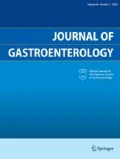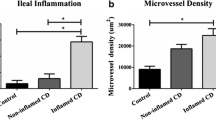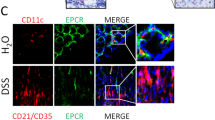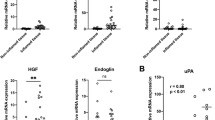Background:
Platelet-derived endothelial cell growth factor (PD-ECGF) is reported to be highly expressed in tumors and inflammatory tissues, but its expression and role in inflammatory bowel disease (IBD) are still unclear. In this study we examined the location and tissue density of cells immunoreactive for PD-ECGF in the colonic mucosa of IBD. Methods: Paraffin-embedded sections of colonic tissue from patients with ulcerative colitis (UC) or Crohn's disease (CD) were immunostained for PD-ECGF. As controls, noninflamed mucosa of IBD, as well as normal colonic mucosa from patients with colorectal cancer, were used. Also, cancer tissues were evaluated. In addition, changes in the expression of PD-ECGF in human umbilical vein endothelial cells (HUVEC) after treatment with inflammatory cytokines and angiogenic factors, as well as after coculture with colon cancer cell lines, were evaluated by flow cytometry. Results: In normal colonic mucosa and noninflamed mucosa of IBD, PD-ECGF expression was negligible. In inflamed colonic mucosa, strong expression was observed, predominantly in macrophages and fibroblasts. Vascular endothelial cells of the inflamed colonic mucosa, but not of normal colonic mucosa or of neoplastic tissues, stained for PD-ECGF, and the microvessel density was significantly increased in the severely inflamed mucosa. Flow cytometry demonstrated that PD-ECGF was constitutively expressed in HUVEC. Inflammatory cytokines and vascular endothelial growth factor (VEGF) increased its expression, whereas basic fibroblast growth factor (bFGF) decreased it. Coculture with colon cancer cell lines in direct contact, but not in those without contact, also resulted in an important decrease in the expression of PD-ECGF in HUVEC. Conclusions: Autocrine production of PD-ECGF by endothelial cells may be a mechanism of inflammatory angiogenesis, but not tumor angiogenesis, and may be particularly important for the maintenance of damaged vasculature in IBD.
Similar content being viewed by others
Author information
Authors and Affiliations
Additional information
Received: September 17, 2001 / Accepted: September 6, 2002
Acknowledgments. This study was supported partly by a Grant-in-Aid for Scientific Research from the Ministry of Education, Culture, Sports, Science, and Technology of Japan, and partly by a grant from the Ministry of Health, Labour, and Welfare of Japan.
Reprint requests to: S. Saito, Present address: Department of Surgery, Chigasaki Municipal Hospital, 5-15-1 Honson, Chigasaki 253-0042, Japan
Rights and permissions
About this article
Cite this article
Saito, S., Tsuno, N., Sunami, E. et al. Expression of platelet-derived endothelial cell growth factor in inflammatory bowel disease. J Gastroenterol 38, 229–237 (2003). https://doi.org/10.1007/s005350300041
Issue Date:
DOI: https://doi.org/10.1007/s005350300041




